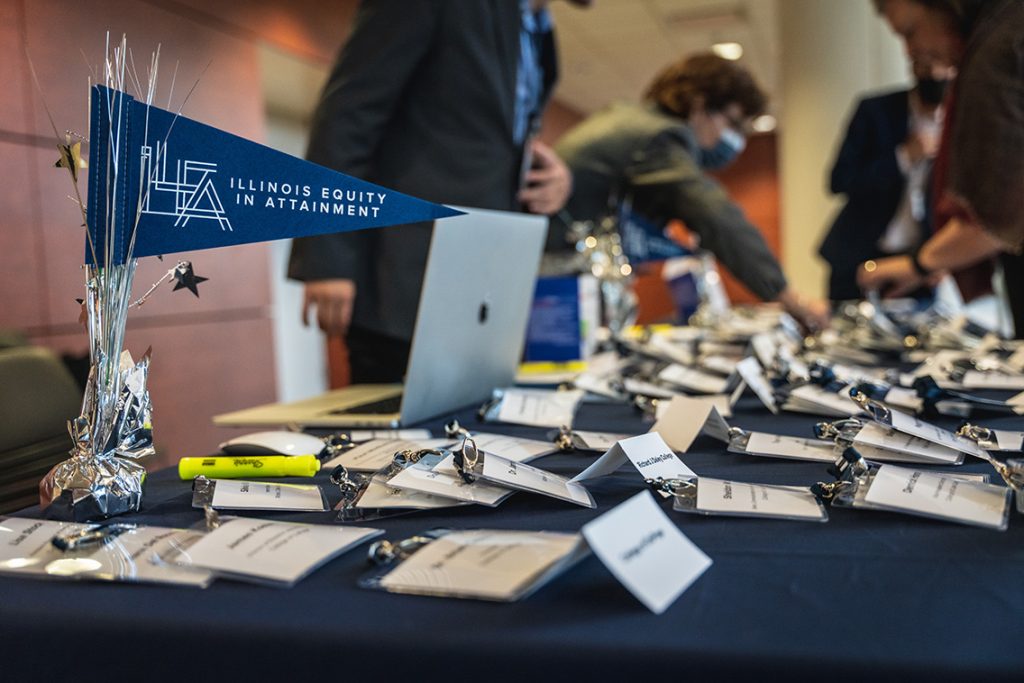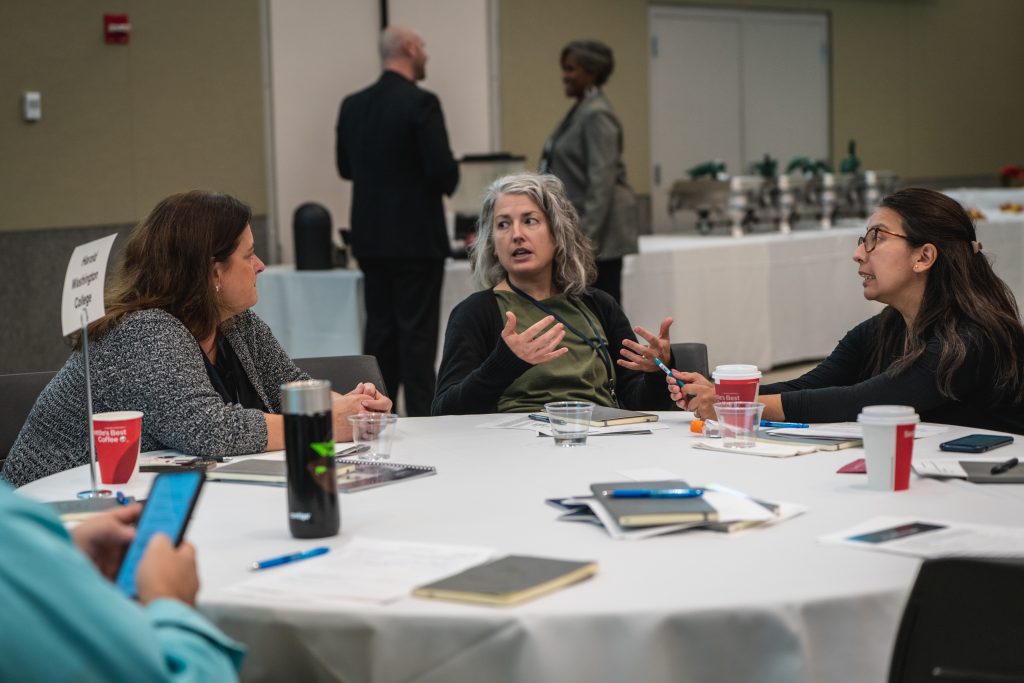As Partnership for College Completion (PCC) Executive Director Lisa Castillo Richmond kicked off the first in-person convening of Illinois Equity In Attainment Initiative (ILEA) partners since 2019, she asked attendees to raise their hands in response to questions about their college experiences.

“Raise your hand if you attended a university in Illinois,” said Castillo Richmond to a room of more than 170 higher education professionals representing 24 Illinois colleges and universities. A few dozen people across the room raised their hands.
“Raise your hand if you were the first in your family to attend college.”
More attendees lifted their hands and looked around at each other recognizing the commonalities in their personal journeys to their current work in higher education.
“I do this exercise to show that we were all once the students we now serve,” Castillo Richmond said.
Since its founding in 2018, ILEA has partnered with 25 colleges and universities across the state of Illinois in taking a critical look at racial and socioeconomic gaps in degree attainment to begin taking actions that increase equitable student success. The annual ILEA Summit offers space for ILEA members to hear from leaders in higher education equity work, learn from each other, share ideas on practices that have shown impact in engaging students and helping them persist toward completion.
The first day of this year’s event was held at the College of DuPage (COD) in Glen Ellyn, IL and included speakers from across the country who are dedicated to higher education equity.
Nevada State College President Dr. DeRionne Pollard delivered the keynote address virtually and gave attendees the opportunity to think about what it truly means to include diversity and equity on campus instead of succumbing to “performative allyship.”
Pollard, the first Black woman to be named the permanent president of any institution in the Nevada System of Higher Education, emphasized the importance of going beyond what has been written on paper and making true and concerted strides to take direct and meaningful action.
“I would challenge you to think about how you show up,” Pollard said. “What is the ethos that guides the way you personally aim your institution in approaching this next level of DEI work.”
The inspiring keynote set the tone for the day and sparked conversation about what it means to truly drive equity on campus.

As part of the ‘Birds of a Feather’ talks, attendees from two- and four- year institutions met to discuss the challenges their students and institutions are facing following the impact of the Covid-19 pandemic– including the changing needs of students in relation to mental health services, affordability, and food insecurity.
“[New attendees] are eager to learn how we as PCC are guiding and advising the cohort along an equity-minded journey toward transformation,” said Joe Saucedo, Senior Partnerships Manager. “They’re also navigating not only the stressors of higher education as a field greatly affected by high turnover, but they’re also dealing with the challenges and opportunities of finding their bearings as a new member of their institutional team.”
Interim Director of Diversity, Equity, and Inclusion at COD Jill Salas and College of Lake County (CLC) Math Instructors Natalia Casper and Shyam Kurup presented on their institution’s developmental education reform implementation plans during the event’s Equity Speaks session. For Equity Speaks, leaders present on new and ongoing efforts on their campuses to better support students and remove unnecessary barriers that get in the way of student success.
During her presentation, Salas discussed how COD changed its GPA requirements and now focuses more on a student’s GPA than their test scores when it comes to placing them in an English course.
During the State of ILEA address to institutional leaders and teams, Castillo Richmond shared preliminary data on student outcomes at the ILEA schools. ILEA partners publicly released their Equity Plans in 2020, a rocky year that presented many challenges for students and communities due to the coronavirus pandemic.
Castillo Richmond reminded the audience that while equity work will never be easy, it was never meant to be.
“We know that, but we’re still here dedicating ourselves to ensuring every university is accessible to every student,” Castillo Richmond said.
Wright College President David Potash and Assistant Dean of First Year Experience & Transition Shannice Berry discussed how they reformed the college’s first-year experience course to better serve students and set them up for success throughout their time in college.
Through the process, Potash and Berry said they learned that there isn’t one singular office, experience, or initiative that will work for every single student. Instead, it’s important to continue to evaluate practices and learn from what works and what doesn’t over time.
As Day 1 of the Summit wrapped up, teams were asked to reflect on what they had learned throughout the day. Many shared new ways they learned to help ensure diversity and equity is part of their lived mission rather than just a plan on paper.
“We’re recharged over here, we’re ready to go,” said the team from Daley College, echoing the many in the room who felt inspired by the lively conversation and knowledge gained throughout the day.
Dr. Judy Marquez Kiyama Delivers Day 2 Keynote Speech and Hosts Workshop
Following a packed day of in-person events, the Summit continued virtually for Day 2, with a keynote and workshop led by Dr. Judy Marquez Kiyama, Associate Vice Provost, Faculty Development within the Office of Faculty Affairs at the University of Arizona
Telling her own story as a child of immigrants and a first-generation college student, Marquez Kiyama emphasized that these identities could not be separated from her teaching or practice in higher education. They needed to be embraced in order to better serve and relate to students.
Marquez Kiyama also shared insight into the University of Arizona’s College Academy for Parents, which helps Latino parents and families prepare their children for college while stressing the importance of higher education at an early age.
During a workshop to help ILEA faculty design culturally responsive learning and teaching spaces, Marquez Kiyama pointed out the value of incorporating student assets into teaching and learning through asking questions about their backgrounds, family, and what importance college played in their upbringing.
“It’s a way to think about our content. Not changing the content, but connecting it to who the students are and have them be able to represent and tell that story,” said Marquez Kiayama, the author of multiple titles including, The Plight of Invisibility: A Community-Based Approach to Understanding the Educational Experiences of Urban Latina/os.
“Both keynotes from the Summit were powerful,” Senior Partnerships Manager Paula Hanley said.
“[The speakers’] ability to connect their own personal stories to this work reminds us how important it is to connect to the voices of our students, faculty and staff as well as the larger communities we serve,” Hanley said. “They both gave us tangible takeaways to apply at the campus level.”

